2023年中考英语复习 专题十六 构词法和阅读猜词义课件(共46张PPT)
文档属性
| 名称 | 2023年中考英语复习 专题十六 构词法和阅读猜词义课件(共46张PPT) |

|
|
| 格式 | ppt | ||
| 文件大小 | 2.1MB | ||
| 资源类型 | 教案 | ||
| 版本资源 | 人教新目标(Go for it)版 | ||
| 科目 | 英语 | ||
| 更新时间 | 2023-06-11 15:13:38 | ||
图片预览

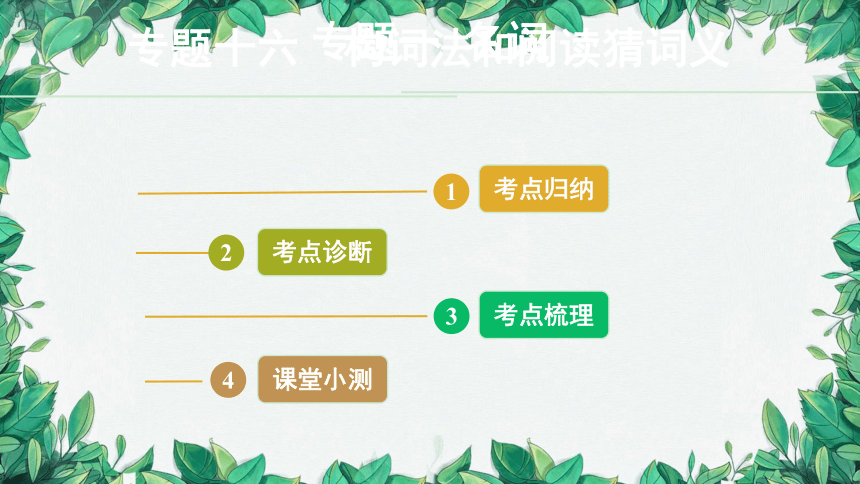
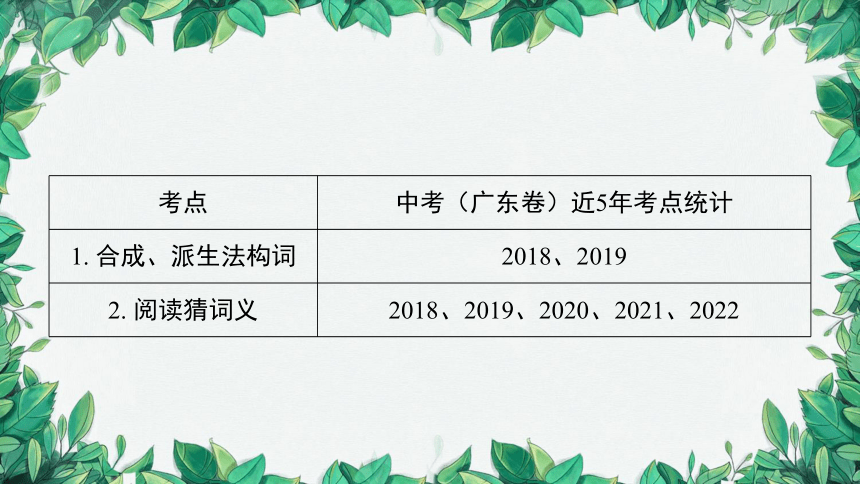
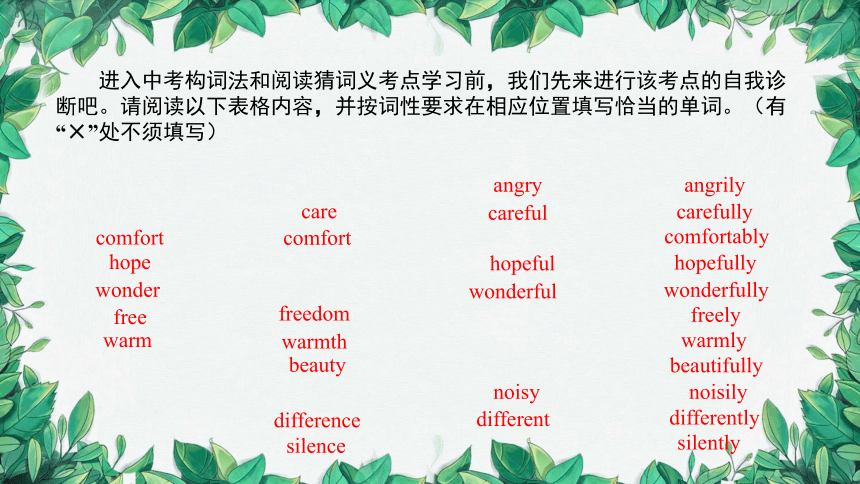

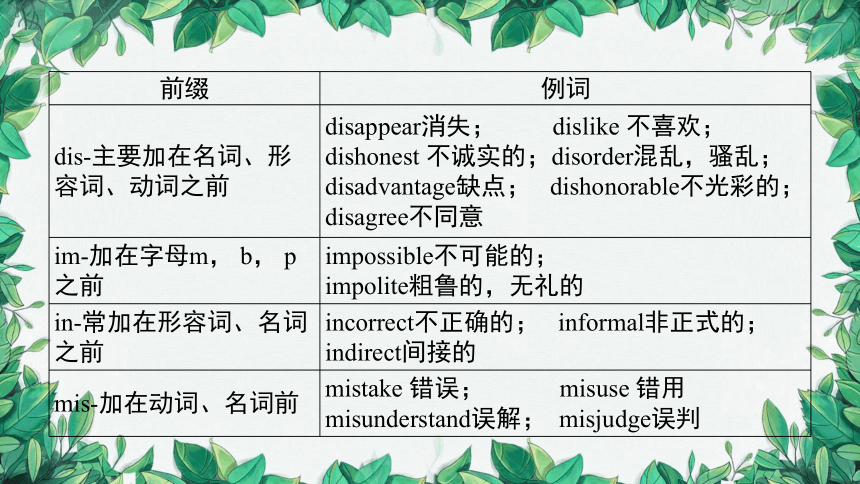
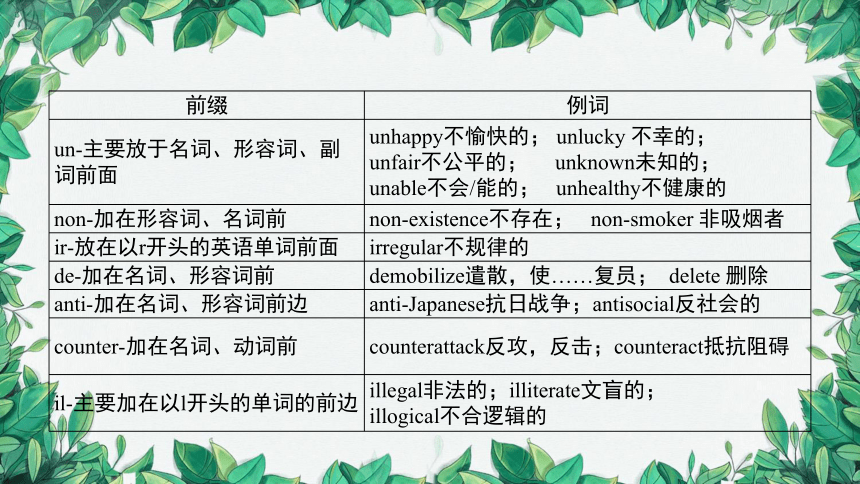
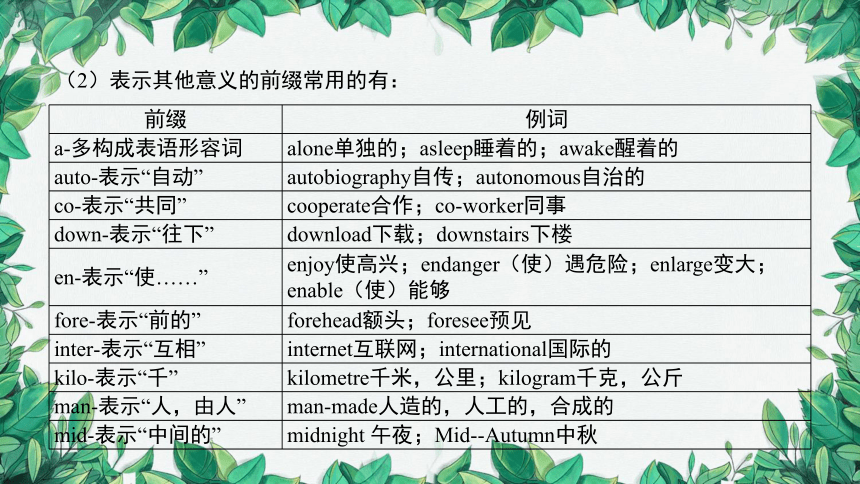
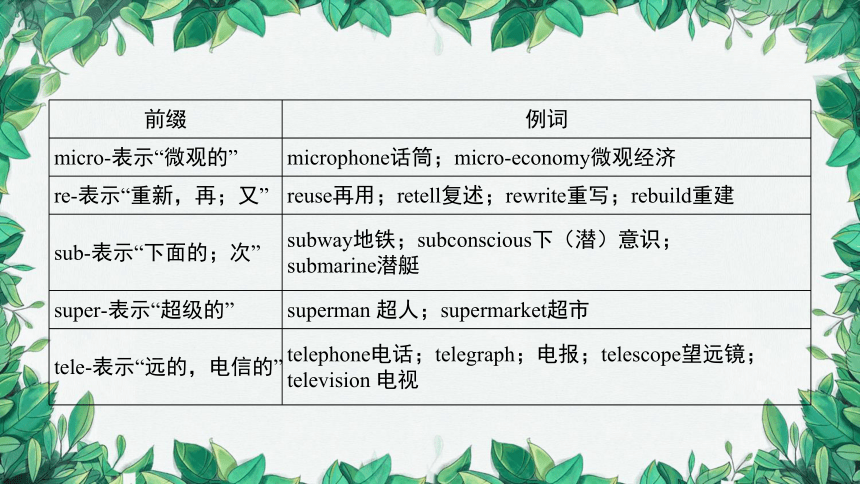
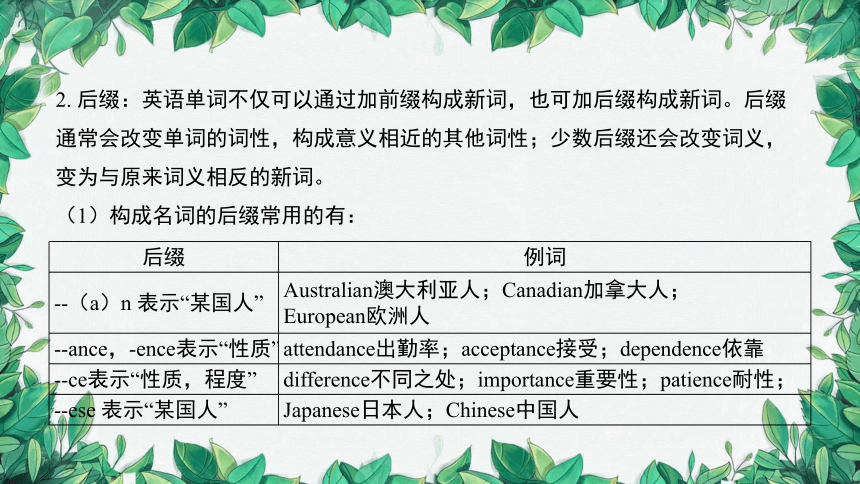

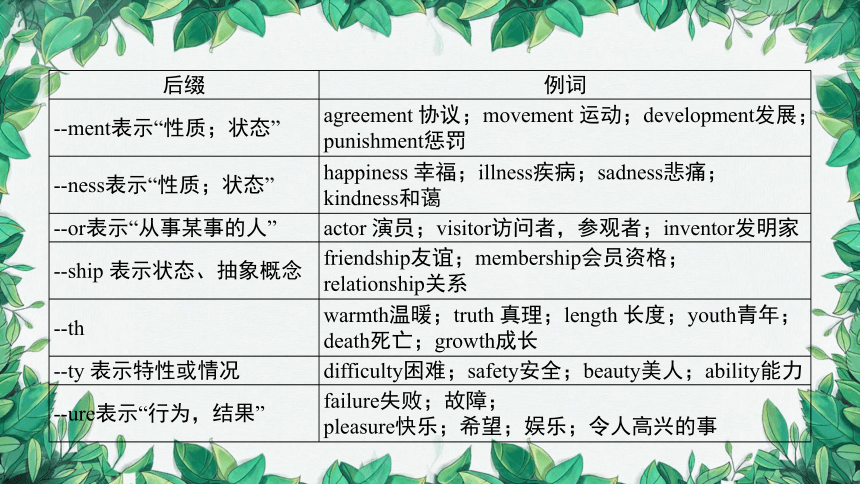
文档简介
(共46张PPT)
第一部分
语法专题训练
专题一 名词
1
考点归纳
2
考点诊断
3
考点梳理
4
专题十六 构词法和阅读猜词义
课堂小测
考点 中考(广东卷)近5年考点统计
1. 合成、派生法构词 2018、2019
2. 阅读猜词义 2018、2019、2020、2021、2022
进入中考构词法和阅读猜词义考点学习前,我们先来进行该考点的自我诊断吧。请阅读以下表格内容,并按词性要求在相应位置填写恰当的单词。(有“×”处不须填写)
care
comfort
freedom
warmth
beauty
difference
silence
comfort
hope
wonder
free
warm
angry
careful
hopeful
wonderful
noisy
different
angrily
carefully
comfortably
hopefully
wonderfully
freely
warmly
beautifully
noisily
differently
silently
在词根前面加前缀或在词根后面加后缀构成一个与原单词意义相近或截然相反的新词叫做派生法。加在单词前面的词缀叫前缀,加在单词后面的词缀叫后缀。
1. 前缀:除少数前缀外,前缀一般改变单词的意义,不改变词性;后缀一般改变词类,而不引起词义的变化。
(1)表示否定意义的前缀,在单词的前面加这类前缀常构成与该词意义相反的新词。常用的否定前缀有:
考点一:
派生法
前缀 例词
dis 主要加在名词、形容词、动词之前 disappear消失; dislike 不喜欢;dishonest 不诚实的;disorder混乱,骚乱;disadvantage缺点; dishonorable不光彩的;disagree不同意
im 加在字母m, b, p之前 impossible不可能的;
impolite粗鲁的,无礼的
in 常加在形容词、名词之前 incorrect不正确的; informal非正式的;indirect间接的
mis 加在动词、名词前 mistake 错误; misuse 错用
misunderstand误解; misjudge误判
前缀 例词
un 主要放于名词、形容词、副词前面 unhappy不愉快的; unlucky 不幸的;
unfair不公平的; unknown未知的;
unable不会/能的; unhealthy不健康的
non 加在形容词、名词前 non existence不存在; non smoker 非吸烟者
ir 放在以r开头的英语单词前面 irregular不规律的
de 加在名词、形容词前 demobilize遣散,使……复员; delete 删除
anti 加在名词、形容词前边 anti Japanese抗日战争;antisocial反社会的
counter 加在名词、动词前 counterattack反攻,反击;counteract抵抗阻碍
il 主要加在以l开头的单词的前边 illegal非法的;illiterate文盲的;
illogical不合逻辑的
(2)表示其他意义的前缀常用的有:
前缀 例词
a 多构成表语形容词 alone单独的;asleep睡着的;awake醒着的
auto 表示“自动” autobiography自传;autonomous自治的
co 表示“共同” cooperate合作;co worker同事
down 表示“往下” download下载;downstairs下楼
en 表示“使……” enjoy使高兴;endanger(使)遇危险;enlarge变大;enable(使)能够
fore 表示“前的” forehead额头;foresee预见
inter 表示“互相” internet互联网;international国际的
kilo 表示“千” kilometre千米,公里;kilogram千克,公斤
man 表示“人,由人” man made人造的,人工的,合成的
mid 表示“中间的” midnight 午夜;Mid -Autumn中秋
前缀 例词
micro 表示“微观的” microphone话筒;micro economy微观经济
re 表示“重新,再;又” reuse再用;retell复述;rewrite重写;rebuild重建
sub 表示“下面的;次” subway地铁;subconscious下(潜)意识;
submarine潜艇
super 表示“超级的” superman 超人;supermarket超市
tele 表示“远的,电信的” telephone电话;telegraph;电报;telescope望远镜;
television 电视
2. 后缀:英语单词不仅可以通过加前缀构成新词,也可加后缀构成新词。后缀通常会改变单词的词性,构成意义相近的其他词性;少数后缀还会改变词义,变为与原来词义相反的新词。
(1)构成名词的后缀常用的有:
后缀 例词
-(a)n 表示“某国人” Australian澳大利亚人;Canadian加拿大人;
European欧洲人
-ance, ence表示“性质” attendance出勤率;acceptance接受;dependence依靠
-ce表示“性质,程度” difference不同之处;importance重要性;patience耐性;
-ese 表示“某国人” Japanese日本人;Chinese中国人
后缀 例词
-ress表示“雌性” actress女演员;waitress女服务员
-(e)r表示“从事某事的人” teacher教师;singer歌手;driver司机;writer作家;runner跑步者;
-ful 表示某容器的容量 handful一把(的量);glassful一杯之量
-hood表示关系或抽象意义 motherhood母亲身份;childhood童年;
neighborhood邻居
-ian表示“精通……的人” musician音乐家;magician魔术师
-ing表示“动作的过程” feeling感觉;reading阅读;building建筑;建筑物
-ion, -sion, -tion,- ation, -ition,表示“行为的过程,状况” action行动;solution解决方案;expression表达;correction改正,修正;pronunciation发音;读法;invitation邀请;decision决定;discussion讨论
-ist表示“专业人员” pianist 钢琴家;scientist 科学家;artist艺术家;violinist小提琴家
后缀 例词
-ment表示“性质;状态” agreement 协议;movement 运动;development发展;punishment惩罚
-ness表示“性质;状态” happiness 幸福;illness疾病;sadness悲痛;
kindness和蔼
-or表示“从事某事的人” actor 演员;visitor访问者,参观者;inventor发明家
-ship 表示状态、抽象概念 friendship友谊;membership会员资格;
relationship关系
-th warmth温暖;truth 真理;length 长度;youth青年;death死亡;growth成长
-ty 表示特性或情况 difficulty困难;safety安全;beauty美人;ability能力
-ure表示“行为,结果” failure失败;故障;
pleasure快乐;希望;娱乐;令人高兴的事
(2)构成动词的后缀常用的有:
后缀 例词
-(e)n多用于形容词名词后变动词“使得,变得” widen加宽;sharpen 削 ;变尖;loosen 使松散;strengthen加强
-fy表示“使……化” beautify美化;purify提纯
-ize表示“使……成为” realize意识到;organize组织
(3)构成形容词的后缀常用的有:
后缀 例词
-able表示“有能力的” reasonable有道理的;eatable 能吃的;enjoyable 令人愉快的
-al natural自然的;national 民族的,国家的;
-an/ian表示“某国(人)的” American美国(人)的;Australian澳大利亚(人)的;Indian印度(人)的
后缀 例词
-ed moved受感动的;interested感兴趣的;excited兴奋的
-en 多用于表示材料的名词后“由……构成的” woolen羊毛的;羊毛制的;golden金的;wooden木制的
-ent/ ant pleasant令人愉快的;dependent依赖的;different不同的
-ern表示“方向的” eastern东方的; southern南方的;
northern北方的; western西方的
-ese表示“某国人的” Chinese中国人的;Japanese日本人的
-ful beautiful美丽的;careful小心的;powerful强大的;
colorful多彩的
-ing moving 感动的;encouraging 鼓舞人心的;
interesting有趣的
-(ic)al electric/electrical 电的;economical经济的;political政治的;scientific科学的
后缀 例词
-ish childish孩子气的;selfish自私的;sheepish 羞怯的
-ive active积极的,collective集体的 ;decisive决定性的;
native本国的
-less 表示“否定” careless 粗心的;useless 无用的;hopeless希望渺茫的;countless不可数的
-like表示“像……的” boylike像男孩一样的;motherlike像母亲一样的
-ly friendly友好的;yearly每年的;monthly每月的;
lovely可爱的;lively活泼的
-ous famous著名的;continuous连续不断的;delicious可口的
-some handsome英俊的,大方的;lonesome孤独的
-(t)y thirsty口渴的;noisy喧闹的;healthy健康的
-y 表示“天气” snowy雪的;rainy下雨的;cloudy多云的;dusty多尘的
【注意】后缀词 ing与 ed的区别:加 ing的后缀词形容词主语一般为物,表示“令人……的”;加 ed的后缀词形容词主语一般为人,表示“某人感到……”。如:
The movie was very interesting. All of us were interested in it.
那部电影很有趣。我们所有的人都对它感兴趣。
(4)构成副词的常用后缀有:
后缀 例词
ly主要用于形容词之后表示程度 angrily生气地; slowly慢慢地,
beautifully美丽地;terribly可怕地
ward(s)主要用于表示方位的词之后表示方向 towards朝……,向……;eastward向东方地;backwards向后退地; upwards向上地;westward向西地; homeward向家去地
wise otherwise否则;likewise同样地;
clockwise顺时针方向地
单项选择。
( )1. The child looked at his brother who was badly wounded.
A.sadly B.sadness C.sadden D.sad
( )2. Although we know it's to win the match, we'll hold on to it till the end.
A.hope B.hopeful C.hopefully D.hopeless
A
D
( )3. It's true that if we set our goals first and just keep going forward, we are more likely to achieve success. And the we get will encourage us to go further for the next goal. So let's set our goals and work hard for them.
A.happy B.happily C.unhappily D.happiness
( )4. The black people were against slavery(奴役) and fought for their bravely. A.freedom B.free C.freely D.frees
D
A
( )5. Mr. Chen is a good teacher. He is always trying his best to make his class in his class.
A.interest B.interested
C.interesting D.interests
( )6. The students got so of the lecture because they were not interested in it.
B.bore B.boring C.bored D.boredom
B
C
( )7. The soldier died for saving the child, so his is heavier than Mount Tai.
A.die B.dead C.died D.death
( )8. The river is more than 600 meters in .
A.longer B.length C.long D.longing
D
B
考点二:
合成法
1. 合成名词
(1)名词+名词:weekend周末 (2)名词+动词:daybreak黎明
(3)动名词+名词:reading- room阅览室 (4)代词+名词:she -wolf母狼
(5)动词+名词:typewriter打字机
(6)名词+及物动词+er/or:pain killer止痛药
(7)形容词+名词:gentleman绅士
(8)介词+名词:afternoon下午
(9)现在分词+名词:flying -fish飞鱼
(10)副词+动词:outbreak爆发
(11)名词+动名词:handwriting书法
(12)名词+介词+名词:editor- in- chief总编辑
2. 合成形容词
(1)名词+形容词 snow- white雪白的
(2)名词+现在分词 English -speaking讲英语的
(3)名词+to+名词 face -to- face面对面的
(4)名词+过去分词 man made人造的
(5)数词+名词 one- way单行的
(6)数词+名词+形容词 two- year -old两岁的
(7)数词+名词+ed five- storeyed五层的
(8)动词+副词 see- through透明的
(9)形容词+名词 high -class高级的
(10)形容词+名词+ed noble -minded高尚的
(11)形容词+形容词 light -blue浅蓝色的
(12)形容词+现在分词 good- looking相貌好看的
(13)副词+形容词 ever green常青的
(14)副词+现在分词 hard working勤劳的
(15)副词+过去分词 well -known著名的
(16)副词+名词 fast- food专门提供快餐服务的
(17)介词+名词 downhill下坡的
3. 合成动词:
(1) 名词+动词sleep walk梦游
(2) 形容词+动词white wash粉刷
4. 合成副词
(1) 形容词+名词hotfoot匆忙地
(2) 形容词+副词everywhere到处
(3) 副词+副词however尽管如此
(4)介词+名词beforehand事先
5. 合成代词
(1) 代词宾格+self herself她自己 (2) 物主代词+self myself我自己
(3) 形容词+名词anything任何东西
6. 合成介词
(1)副词+名词inside在……里面 (2)介词+副词within在……之内
(3)副词+介词into进入
阅读理解猜词题。
( )9. To help overcome Fan's sadness, Peng, who was a big fan of dancing in public squares, invited Fan to join her. The minute he began, his suffering disappeared like magic.
Whenever we feel upset the shuffle dance always helps cheer us up and lighten our mood. It has been such an uplift in our lives.
Q:What does the word uplift in the passage mean in Chinese?
A.反馈 B.打击 C.鼓舞 D.拓展
C
( )10. Suddenly, the absent minded professor shouted, “Heavens! Someone stole my wallet!” His wife said, “Didn't you feel a hand in your pocket?” The professor thought for a while and said, “Yes, but I thought it was mine. ”
Q: What does the word absent minded in the passage mean in Chinese?
A.缺席的 B.心不在焉的
C.专心致志的 D.介意的
B
技巧一: 转折关系(Transition)
考点三:
阅读猜词义
eg. Tom is a lazy student, but his classmate Jim is industrious.(答案:C)
A.懒惰的 B.聪明的
C.勤奋的 D.勇敢的
技巧二: 同义关系(Similarity)
eg. Tom always likes talking in class, and he is the most loquacious of all the boys in the class. (答案:A)
A.爱说话的 B.好玩的
C.刻苦的 D.认真的
技巧三: 释义关系(Definition)
eg. In the class, don't put your glass cup on the desk, because it is very hard but also very brittle—that is, it will break easily. (答案:A)
A.易碎的 B.坚硬的 C.好看的 D.实用的
技巧四: 举例 (Example)
eg. The students should have stationery, such as pens, pencils, paper, erasers and so on. (答案:C)
A.纪律 B.规矩 C.文具 D.方法
技巧五: 上下文语境(Context)
eg. This dictionary tells us about English words and how to use them in reading, writing and speaking English. If we refer to the word “colour” in the dictionary, we will find two spellings for this word. “Colour” is used in British English, while “color” is used in American English. (答案:B)
A.take in B.look up
C.turn in D.stand for
技巧六: 因果关系(Cause and effect)
eg. You should blame him, because it was his fault. (答案:D)
A.原谅 B.表扬
C.理解 D.责备
阅读理解猜词题。
( )11. In summer, although our classroom is very cool in the morning, it is tropical in the afternoon.
A.炎热的 B.寒冷的
C.凉爽的 D.特别的
A
( )12. Although we use both sides of our brains, one side is usually stronger or dominantW.I often do homework with my left hand. I can't write with my right hand.
A.强大的 B.沉重的
C.懒惰的 D.年轻的
A
( )13. We have learnt a lot of knowledge at school since we were very young. We are not illiterate, in other words,we can read and write.
A.读书人 B.文盲 C.病人 D.学者
( )14. We often take provision to the park. For example, there is meat, bread, milk, sugar and fruit.
A.食物 B.蔬菜 C.水果 D.课本
A
B
( )15. My favorite subject is English, but I'm not good at writing. I want to sharpen up my writing skills. So,I usually keep a diary about something interesting in English.
A.achieve B.improve
C.form D.teach
B
(满分:20分) 你的得分: .
一、单句填空。(共10小题,每小题1分,共10分)
1. She hoped that her son would become a (music).
2. Don't believe her. I can truly say that she did not tell us the . (true).
3. (lucky), they escaped from the burning building with the help of the firemen.
4. I think travelling by train is more popular, because it's much cheaper and far more (enjoy).
musician
truth
Luckily
enjoyable
5. More and more people all over the country are worried about food
(safe).
6. Thank you for your (kind).
7. The video game machine is so fantastic that all of us are . (interest)in it.
8. “It is never too late to learn” is a Chinese (say).
9. He has made a (decide)to visit the West Lake in the coming summer holidays.
10. It's (polite)to ask a lady about her age in western countries.
safety
kindness
interested
saying
decision
impolite
二、阅读理解。(共5小题,每小题2分,共10分)(2021·普宁模拟)
Keeping Earth healthy is an important job. That's what the environmental protection is all about. One of the hardest jobs is solving the problem of rubbish. The trouble with rubbish is that more and more rubbish is produced and we could run out of places to put it.
A lot of our rubbish comes from plastic. Juice, water, shampoo(洗发水)—these all come in plastic bottles. Too much plastic is one of our worst rubbish problems.
When a plastic bottle becomes rubbish, it remains rubbish for hundreds of years. That's because plastic is hard to decompose in the earth.
Is there a better way to deal with plastic? Yes! We can recycle it. When we recycle, we take something that's been used and turn it into something new. Here is how it works. People save their plastic bottles. A special recycling truck picks the bottles up and takes them to the recycling center. Here, the bottles are melted(熔化) down. The melted plastic is sent to a factory.
At the factory, the old plastic is made into something new. It may become a new bottle. It may become a backpack or maybe even a slide(滑梯) at the playground!
Sometimes there are not many things kids can do to help solve our planet's problems. But kids can do a lot about rubbish. Recycling is one way all people, young and old, can make a big difference!
( )11. What' s the problem with rubbish?
A.Rubbish is hard to deal with.
B.Rubbish pollutes the environment.
C.Collecting rubbish is very difficult.
D.There will be no place to put growing rubbish.
( )12. What does the underlined word “decompose” in Paragraph 2 mean in Chinese?
A.燃烧 B.挥发 C.膨胀 D.分解
D
D
( )13. Put the steps of dealing with plastic in order.
a.People save their plastic bottles.
b.The melted plastic is sent to a factory.
c.The bottles are melted down.
d.A special truck takes them to the recycling center.
A.a—b—c—d B.b—d—c—a
C.a—c—b—d D.a—d—c—b
D
( )14. What can we know from the passage?
A.Recycling depends on professional tools.
B.Kids are too young to help save our earth.
C.People can reduce rubbish by recycling plastic.
D.The environment is the biggest problem on our planet.
C
( )15. What is the best title for the passage?
A.The Earth—Our Only Home.
B.Where does Rubbish Come from?
C.Recycling Makes Our Earth Healthy.
D.How does Plastic Influence Our Life?
C
第一部分
语法专题训练
专题一 名词
1
考点归纳
2
考点诊断
3
考点梳理
4
专题十六 构词法和阅读猜词义
课堂小测
考点 中考(广东卷)近5年考点统计
1. 合成、派生法构词 2018、2019
2. 阅读猜词义 2018、2019、2020、2021、2022
进入中考构词法和阅读猜词义考点学习前,我们先来进行该考点的自我诊断吧。请阅读以下表格内容,并按词性要求在相应位置填写恰当的单词。(有“×”处不须填写)
care
comfort
freedom
warmth
beauty
difference
silence
comfort
hope
wonder
free
warm
angry
careful
hopeful
wonderful
noisy
different
angrily
carefully
comfortably
hopefully
wonderfully
freely
warmly
beautifully
noisily
differently
silently
在词根前面加前缀或在词根后面加后缀构成一个与原单词意义相近或截然相反的新词叫做派生法。加在单词前面的词缀叫前缀,加在单词后面的词缀叫后缀。
1. 前缀:除少数前缀外,前缀一般改变单词的意义,不改变词性;后缀一般改变词类,而不引起词义的变化。
(1)表示否定意义的前缀,在单词的前面加这类前缀常构成与该词意义相反的新词。常用的否定前缀有:
考点一:
派生法
前缀 例词
dis 主要加在名词、形容词、动词之前 disappear消失; dislike 不喜欢;dishonest 不诚实的;disorder混乱,骚乱;disadvantage缺点; dishonorable不光彩的;disagree不同意
im 加在字母m, b, p之前 impossible不可能的;
impolite粗鲁的,无礼的
in 常加在形容词、名词之前 incorrect不正确的; informal非正式的;indirect间接的
mis 加在动词、名词前 mistake 错误; misuse 错用
misunderstand误解; misjudge误判
前缀 例词
un 主要放于名词、形容词、副词前面 unhappy不愉快的; unlucky 不幸的;
unfair不公平的; unknown未知的;
unable不会/能的; unhealthy不健康的
non 加在形容词、名词前 non existence不存在; non smoker 非吸烟者
ir 放在以r开头的英语单词前面 irregular不规律的
de 加在名词、形容词前 demobilize遣散,使……复员; delete 删除
anti 加在名词、形容词前边 anti Japanese抗日战争;antisocial反社会的
counter 加在名词、动词前 counterattack反攻,反击;counteract抵抗阻碍
il 主要加在以l开头的单词的前边 illegal非法的;illiterate文盲的;
illogical不合逻辑的
(2)表示其他意义的前缀常用的有:
前缀 例词
a 多构成表语形容词 alone单独的;asleep睡着的;awake醒着的
auto 表示“自动” autobiography自传;autonomous自治的
co 表示“共同” cooperate合作;co worker同事
down 表示“往下” download下载;downstairs下楼
en 表示“使……” enjoy使高兴;endanger(使)遇危险;enlarge变大;enable(使)能够
fore 表示“前的” forehead额头;foresee预见
inter 表示“互相” internet互联网;international国际的
kilo 表示“千” kilometre千米,公里;kilogram千克,公斤
man 表示“人,由人” man made人造的,人工的,合成的
mid 表示“中间的” midnight 午夜;Mid -Autumn中秋
前缀 例词
micro 表示“微观的” microphone话筒;micro economy微观经济
re 表示“重新,再;又” reuse再用;retell复述;rewrite重写;rebuild重建
sub 表示“下面的;次” subway地铁;subconscious下(潜)意识;
submarine潜艇
super 表示“超级的” superman 超人;supermarket超市
tele 表示“远的,电信的” telephone电话;telegraph;电报;telescope望远镜;
television 电视
2. 后缀:英语单词不仅可以通过加前缀构成新词,也可加后缀构成新词。后缀通常会改变单词的词性,构成意义相近的其他词性;少数后缀还会改变词义,变为与原来词义相反的新词。
(1)构成名词的后缀常用的有:
后缀 例词
-(a)n 表示“某国人” Australian澳大利亚人;Canadian加拿大人;
European欧洲人
-ance, ence表示“性质” attendance出勤率;acceptance接受;dependence依靠
-ce表示“性质,程度” difference不同之处;importance重要性;patience耐性;
-ese 表示“某国人” Japanese日本人;Chinese中国人
后缀 例词
-ress表示“雌性” actress女演员;waitress女服务员
-(e)r表示“从事某事的人” teacher教师;singer歌手;driver司机;writer作家;runner跑步者;
-ful 表示某容器的容量 handful一把(的量);glassful一杯之量
-hood表示关系或抽象意义 motherhood母亲身份;childhood童年;
neighborhood邻居
-ian表示“精通……的人” musician音乐家;magician魔术师
-ing表示“动作的过程” feeling感觉;reading阅读;building建筑;建筑物
-ion, -sion, -tion,- ation, -ition,表示“行为的过程,状况” action行动;solution解决方案;expression表达;correction改正,修正;pronunciation发音;读法;invitation邀请;decision决定;discussion讨论
-ist表示“专业人员” pianist 钢琴家;scientist 科学家;artist艺术家;violinist小提琴家
后缀 例词
-ment表示“性质;状态” agreement 协议;movement 运动;development发展;punishment惩罚
-ness表示“性质;状态” happiness 幸福;illness疾病;sadness悲痛;
kindness和蔼
-or表示“从事某事的人” actor 演员;visitor访问者,参观者;inventor发明家
-ship 表示状态、抽象概念 friendship友谊;membership会员资格;
relationship关系
-th warmth温暖;truth 真理;length 长度;youth青年;death死亡;growth成长
-ty 表示特性或情况 difficulty困难;safety安全;beauty美人;ability能力
-ure表示“行为,结果” failure失败;故障;
pleasure快乐;希望;娱乐;令人高兴的事
(2)构成动词的后缀常用的有:
后缀 例词
-(e)n多用于形容词名词后变动词“使得,变得” widen加宽;sharpen 削 ;变尖;loosen 使松散;strengthen加强
-fy表示“使……化” beautify美化;purify提纯
-ize表示“使……成为” realize意识到;organize组织
(3)构成形容词的后缀常用的有:
后缀 例词
-able表示“有能力的” reasonable有道理的;eatable 能吃的;enjoyable 令人愉快的
-al natural自然的;national 民族的,国家的;
-an/ian表示“某国(人)的” American美国(人)的;Australian澳大利亚(人)的;Indian印度(人)的
后缀 例词
-ed moved受感动的;interested感兴趣的;excited兴奋的
-en 多用于表示材料的名词后“由……构成的” woolen羊毛的;羊毛制的;golden金的;wooden木制的
-ent/ ant pleasant令人愉快的;dependent依赖的;different不同的
-ern表示“方向的” eastern东方的; southern南方的;
northern北方的; western西方的
-ese表示“某国人的” Chinese中国人的;Japanese日本人的
-ful beautiful美丽的;careful小心的;powerful强大的;
colorful多彩的
-ing moving 感动的;encouraging 鼓舞人心的;
interesting有趣的
-(ic)al electric/electrical 电的;economical经济的;political政治的;scientific科学的
后缀 例词
-ish childish孩子气的;selfish自私的;sheepish 羞怯的
-ive active积极的,collective集体的 ;decisive决定性的;
native本国的
-less 表示“否定” careless 粗心的;useless 无用的;hopeless希望渺茫的;countless不可数的
-like表示“像……的” boylike像男孩一样的;motherlike像母亲一样的
-ly friendly友好的;yearly每年的;monthly每月的;
lovely可爱的;lively活泼的
-ous famous著名的;continuous连续不断的;delicious可口的
-some handsome英俊的,大方的;lonesome孤独的
-(t)y thirsty口渴的;noisy喧闹的;healthy健康的
-y 表示“天气” snowy雪的;rainy下雨的;cloudy多云的;dusty多尘的
【注意】后缀词 ing与 ed的区别:加 ing的后缀词形容词主语一般为物,表示“令人……的”;加 ed的后缀词形容词主语一般为人,表示“某人感到……”。如:
The movie was very interesting. All of us were interested in it.
那部电影很有趣。我们所有的人都对它感兴趣。
(4)构成副词的常用后缀有:
后缀 例词
ly主要用于形容词之后表示程度 angrily生气地; slowly慢慢地,
beautifully美丽地;terribly可怕地
ward(s)主要用于表示方位的词之后表示方向 towards朝……,向……;eastward向东方地;backwards向后退地; upwards向上地;westward向西地; homeward向家去地
wise otherwise否则;likewise同样地;
clockwise顺时针方向地
单项选择。
( )1. The child looked at his brother who was badly wounded.
A.sadly B.sadness C.sadden D.sad
( )2. Although we know it's to win the match, we'll hold on to it till the end.
A.hope B.hopeful C.hopefully D.hopeless
A
D
( )3. It's true that if we set our goals first and just keep going forward, we are more likely to achieve success. And the we get will encourage us to go further for the next goal. So let's set our goals and work hard for them.
A.happy B.happily C.unhappily D.happiness
( )4. The black people were against slavery(奴役) and fought for their bravely. A.freedom B.free C.freely D.frees
D
A
( )5. Mr. Chen is a good teacher. He is always trying his best to make his class in his class.
A.interest B.interested
C.interesting D.interests
( )6. The students got so of the lecture because they were not interested in it.
B.bore B.boring C.bored D.boredom
B
C
( )7. The soldier died for saving the child, so his is heavier than Mount Tai.
A.die B.dead C.died D.death
( )8. The river is more than 600 meters in .
A.longer B.length C.long D.longing
D
B
考点二:
合成法
1. 合成名词
(1)名词+名词:weekend周末 (2)名词+动词:daybreak黎明
(3)动名词+名词:reading- room阅览室 (4)代词+名词:she -wolf母狼
(5)动词+名词:typewriter打字机
(6)名词+及物动词+er/or:pain killer止痛药
(7)形容词+名词:gentleman绅士
(8)介词+名词:afternoon下午
(9)现在分词+名词:flying -fish飞鱼
(10)副词+动词:outbreak爆发
(11)名词+动名词:handwriting书法
(12)名词+介词+名词:editor- in- chief总编辑
2. 合成形容词
(1)名词+形容词 snow- white雪白的
(2)名词+现在分词 English -speaking讲英语的
(3)名词+to+名词 face -to- face面对面的
(4)名词+过去分词 man made人造的
(5)数词+名词 one- way单行的
(6)数词+名词+形容词 two- year -old两岁的
(7)数词+名词+ed five- storeyed五层的
(8)动词+副词 see- through透明的
(9)形容词+名词 high -class高级的
(10)形容词+名词+ed noble -minded高尚的
(11)形容词+形容词 light -blue浅蓝色的
(12)形容词+现在分词 good- looking相貌好看的
(13)副词+形容词 ever green常青的
(14)副词+现在分词 hard working勤劳的
(15)副词+过去分词 well -known著名的
(16)副词+名词 fast- food专门提供快餐服务的
(17)介词+名词 downhill下坡的
3. 合成动词:
(1) 名词+动词sleep walk梦游
(2) 形容词+动词white wash粉刷
4. 合成副词
(1) 形容词+名词hotfoot匆忙地
(2) 形容词+副词everywhere到处
(3) 副词+副词however尽管如此
(4)介词+名词beforehand事先
5. 合成代词
(1) 代词宾格+self herself她自己 (2) 物主代词+self myself我自己
(3) 形容词+名词anything任何东西
6. 合成介词
(1)副词+名词inside在……里面 (2)介词+副词within在……之内
(3)副词+介词into进入
阅读理解猜词题。
( )9. To help overcome Fan's sadness, Peng, who was a big fan of dancing in public squares, invited Fan to join her. The minute he began, his suffering disappeared like magic.
Whenever we feel upset the shuffle dance always helps cheer us up and lighten our mood. It has been such an uplift in our lives.
Q:What does the word uplift in the passage mean in Chinese?
A.反馈 B.打击 C.鼓舞 D.拓展
C
( )10. Suddenly, the absent minded professor shouted, “Heavens! Someone stole my wallet!” His wife said, “Didn't you feel a hand in your pocket?” The professor thought for a while and said, “Yes, but I thought it was mine. ”
Q: What does the word absent minded in the passage mean in Chinese?
A.缺席的 B.心不在焉的
C.专心致志的 D.介意的
B
技巧一: 转折关系(Transition)
考点三:
阅读猜词义
eg. Tom is a lazy student, but his classmate Jim is industrious.(答案:C)
A.懒惰的 B.聪明的
C.勤奋的 D.勇敢的
技巧二: 同义关系(Similarity)
eg. Tom always likes talking in class, and he is the most loquacious of all the boys in the class. (答案:A)
A.爱说话的 B.好玩的
C.刻苦的 D.认真的
技巧三: 释义关系(Definition)
eg. In the class, don't put your glass cup on the desk, because it is very hard but also very brittle—that is, it will break easily. (答案:A)
A.易碎的 B.坚硬的 C.好看的 D.实用的
技巧四: 举例 (Example)
eg. The students should have stationery, such as pens, pencils, paper, erasers and so on. (答案:C)
A.纪律 B.规矩 C.文具 D.方法
技巧五: 上下文语境(Context)
eg. This dictionary tells us about English words and how to use them in reading, writing and speaking English. If we refer to the word “colour” in the dictionary, we will find two spellings for this word. “Colour” is used in British English, while “color” is used in American English. (答案:B)
A.take in B.look up
C.turn in D.stand for
技巧六: 因果关系(Cause and effect)
eg. You should blame him, because it was his fault. (答案:D)
A.原谅 B.表扬
C.理解 D.责备
阅读理解猜词题。
( )11. In summer, although our classroom is very cool in the morning, it is tropical in the afternoon.
A.炎热的 B.寒冷的
C.凉爽的 D.特别的
A
( )12. Although we use both sides of our brains, one side is usually stronger or dominantW.I often do homework with my left hand. I can't write with my right hand.
A.强大的 B.沉重的
C.懒惰的 D.年轻的
A
( )13. We have learnt a lot of knowledge at school since we were very young. We are not illiterate, in other words,we can read and write.
A.读书人 B.文盲 C.病人 D.学者
( )14. We often take provision to the park. For example, there is meat, bread, milk, sugar and fruit.
A.食物 B.蔬菜 C.水果 D.课本
A
B
( )15. My favorite subject is English, but I'm not good at writing. I want to sharpen up my writing skills. So,I usually keep a diary about something interesting in English.
A.achieve B.improve
C.form D.teach
B
(满分:20分) 你的得分: .
一、单句填空。(共10小题,每小题1分,共10分)
1. She hoped that her son would become a (music).
2. Don't believe her. I can truly say that she did not tell us the . (true).
3. (lucky), they escaped from the burning building with the help of the firemen.
4. I think travelling by train is more popular, because it's much cheaper and far more (enjoy).
musician
truth
Luckily
enjoyable
5. More and more people all over the country are worried about food
(safe).
6. Thank you for your (kind).
7. The video game machine is so fantastic that all of us are . (interest)in it.
8. “It is never too late to learn” is a Chinese (say).
9. He has made a (decide)to visit the West Lake in the coming summer holidays.
10. It's (polite)to ask a lady about her age in western countries.
safety
kindness
interested
saying
decision
impolite
二、阅读理解。(共5小题,每小题2分,共10分)(2021·普宁模拟)
Keeping Earth healthy is an important job. That's what the environmental protection is all about. One of the hardest jobs is solving the problem of rubbish. The trouble with rubbish is that more and more rubbish is produced and we could run out of places to put it.
A lot of our rubbish comes from plastic. Juice, water, shampoo(洗发水)—these all come in plastic bottles. Too much plastic is one of our worst rubbish problems.
When a plastic bottle becomes rubbish, it remains rubbish for hundreds of years. That's because plastic is hard to decompose in the earth.
Is there a better way to deal with plastic? Yes! We can recycle it. When we recycle, we take something that's been used and turn it into something new. Here is how it works. People save their plastic bottles. A special recycling truck picks the bottles up and takes them to the recycling center. Here, the bottles are melted(熔化) down. The melted plastic is sent to a factory.
At the factory, the old plastic is made into something new. It may become a new bottle. It may become a backpack or maybe even a slide(滑梯) at the playground!
Sometimes there are not many things kids can do to help solve our planet's problems. But kids can do a lot about rubbish. Recycling is one way all people, young and old, can make a big difference!
( )11. What' s the problem with rubbish?
A.Rubbish is hard to deal with.
B.Rubbish pollutes the environment.
C.Collecting rubbish is very difficult.
D.There will be no place to put growing rubbish.
( )12. What does the underlined word “decompose” in Paragraph 2 mean in Chinese?
A.燃烧 B.挥发 C.膨胀 D.分解
D
D
( )13. Put the steps of dealing with plastic in order.
a.People save their plastic bottles.
b.The melted plastic is sent to a factory.
c.The bottles are melted down.
d.A special truck takes them to the recycling center.
A.a—b—c—d B.b—d—c—a
C.a—c—b—d D.a—d—c—b
D
( )14. What can we know from the passage?
A.Recycling depends on professional tools.
B.Kids are too young to help save our earth.
C.People can reduce rubbish by recycling plastic.
D.The environment is the biggest problem on our planet.
C
( )15. What is the best title for the passage?
A.The Earth—Our Only Home.
B.Where does Rubbish Come from?
C.Recycling Makes Our Earth Healthy.
D.How does Plastic Influence Our Life?
C
同课章节目录
- 词法
- 名词
- 动词和动词短语
- 动词语态
- 动词时态
- 助动词和情态动词
- 非谓语动词
- 冠词
- 代词
- 数词和量词
- 形容词副词及其比较等级
- 介词和介词短语
- 连词和感叹词
- 构词法
- 相似、相近词比较
- 句法
- 陈述句
- 一般疑问句和否定疑问句
- 特殊疑问句及选择疑问句
- 反意疑问句
- 存在句(There be句型)
- 宾语从句
- 定语从句
- 状语从句
- 主谓一致问题
- 简单句
- 并列句
- 复合句
- 主谓一致
- 主、表语从句
- 名词性从句
- 直接引语和间接引语
- 虚拟语气
- 感叹句
- 强调句
- 倒装句
- 祈使句
- 句子的成分
- 句子的分类
- 题型专区
- 单项选择部分
- 易错题
- 完形填空
- 阅读理解
- 词汇练习
- 听说训练
- 句型转换
- 补全对话
- 短文改错
- 翻译
- 书面表达
- 任务型阅读
- 语法填空
- 其他资料
